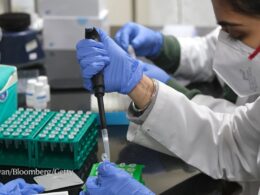The Economist
Nov 29th 2021
Editor’s note (December 3rd): This article was updated to include our live tracker of Omicron infections
SINCE A NEW variant of SARS-CoV-2 was identified in southern Africa, dozens of countries have found cases of it too. The new strain of the virus, B.1.1.529, was first detected in genetic samples from Botswana and South Africa. On November 24th South Africa’s health authorities told the World Health Organisation, which quickly labelled it a “variant of concern” and assigned it the Greek letter Omicron. Just how long-and where-it has been circulating is still not fully clear.
With so little data about Omicron, much remains unknown. Initial evidence from South Africa suggests that it may be more transmissible than the Delta variant, which has accounted for nearly all new global cases since August. Not all variants are as successful as Delta. In general they are troubling if mutations in their genetic code result in any one of four changes in behaviour: a rise in transmissibility; a weaker immune response from vaccines (and antibodies acquired by infection, too); a way of evading detection by tests; or causing more severe illness. Scientists are yet to discover whether Omicron does any of these things. But it does have a large number of mutations on its spike protein which have been associated with both increased transmissibility and severity in other variants.
In an effort to slow its spread, many countries swiftly introduced either strict quarantine rules or travel bans for people arriving from southern African countries. South Africa has complained that it is being unfairly punished for its diligence in sequencing the disease, which might create a disincentive for other countries to invest in genomic sequencing. During 2021, 5.2m cases of covid-19 have been sequenced, representing 3% of the total confirmed caseload. Yet some countries sequence far more than others. South Africa has sequenced 1% of its cases; Britain, which has pioneered many of the techniques involved, has sequenced 15%.
Such restrictions can only buy time rather than prevent the seeding of a new variant altogether. If a new variant takes hold domestically in the way that Delta did, community transmission will soon render insignificant the prevention of a small number of cases imported by travellers.
Air travel offers a clue to where the variant is likely to have got to. In November around 450,000 seats on international flights were available from countries in southern Africa, according to OAG, a data provider. Around 80% were for travel within the region, with a further 7% going to western Europe and 5% to the Middle East. During the northern hemisphere’s summer about 7,000 passengers a month were flying from South Africa into Amsterdam and a further 4,000 into both Frankfurt and Paris. Many of these people would then transit on to other destinations. There have been plenty of chances for Omicron to have made its way around the world already. ■
Originally published at https://www.economist.com on November 29, 2021.












